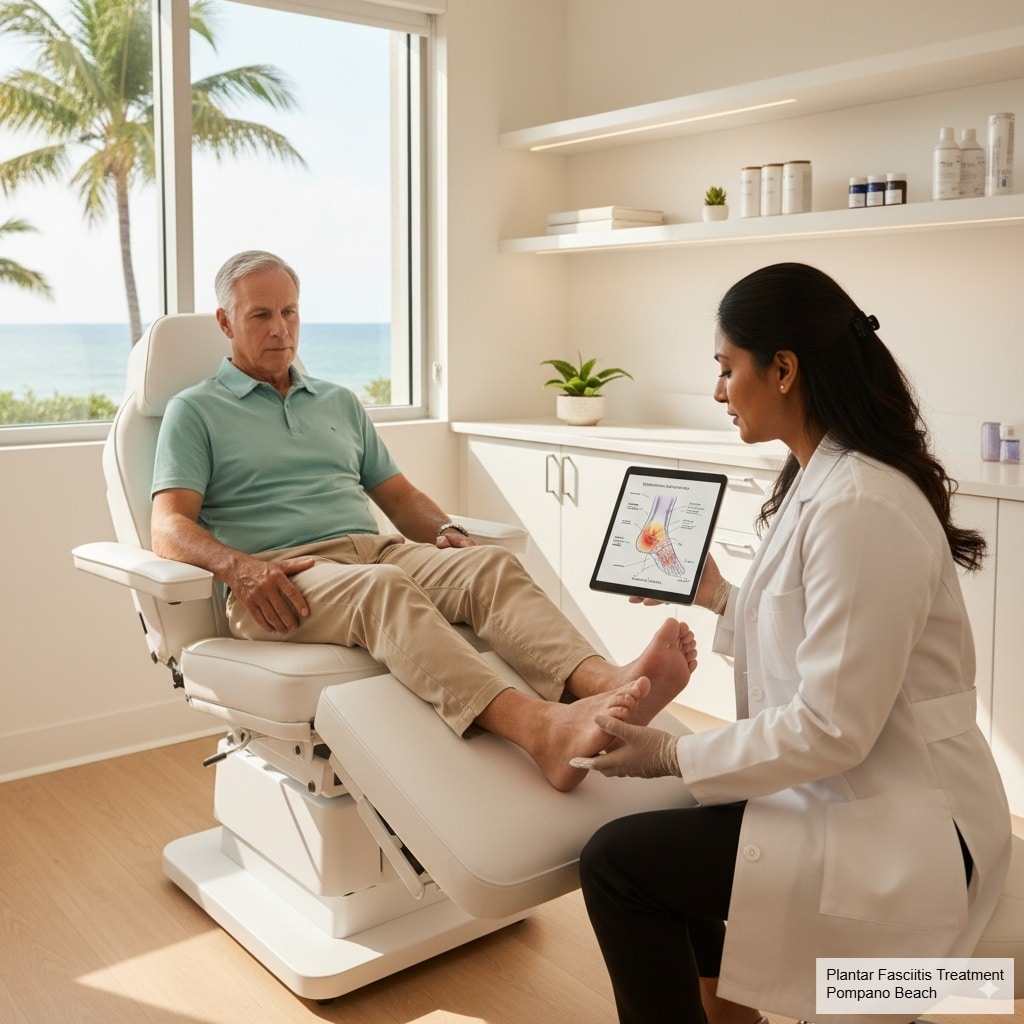Stretching and Exercise Protocols
Targeted stretching exercises address tight structures contributing to plantar fasciitis, including the plantar fascia itself, calf muscles, and Achilles tendon. Dr. Pham prescribes specific stretching protocols tailored to individual patient needs and limitations.
The plantar fascia stretch involves sitting with the affected leg crossed over the opposite knee, grasping the toes, and gently pulling them toward the shin until stretch sensation occurs along the foot's bottom. This exercise should be performed for 15-30 second intervals multiple times daily.
Calf stretching includes both gastrocnemius and soleus muscle groups. Patients perform wall stretches with straight and bent knee positions to address different muscle components. Towel stretches provide alternative methods for patients with mobility limitations.
Strengthening exercises complement stretching protocols by improving foot and ankle stability while reducing recurrence risk. Dr. Pham demonstrates proper exercise techniques during office visits and provides detailed home exercise instructions.
Advanced Treatment Options
When conservative measures prove insufficient, additional advanced modalities are available. Beyond corticosteroid injections, Dr. Pham also provides regenerative options like PRP therapy and stem cell therapy, which help accelerate healing by stimulating the body’s natural repair mechanisms.
For patients requiring tissue repair support, exosome therapy may also be discussed as a cutting-edge advancement in regenerative medicine. Custom orthotics and physical therapy round out this comprehensive, nonsurgical approach.
Night splints maintain gentle plantar fascia and Achilles tendon stretch during sleep hours, preventing morning stiffness and reducing first-step pain intensity. Physical therapy referrals provide additional hands-on treatment including manual therapy, ultrasound, and specialized exercise instruction.
Surgical Considerations
Surgical intervention becomes necessary for fewer than 5% of plantar fasciitis cases when conservative treatment fails after extensive trial periods. Dr. Pham thoroughly discusses surgical options, risks, benefits, and expected outcomes with patients considering surgical intervention.
Plantar fascia release procedures involve partial cutting of the plantar fascia to reduce tension, but these surgeries carry risks including arch height reduction and potential lateral foot pain development.
Prevention Strategies and Long-Term Management
Footwear Selection and Modification
Proper footwear selection plays crucial roles in plantar fasciitis prevention and management. Dr. Pham recommends shoes featuring adequate arch support, firm heel counters, and sufficient cushioning in heel and forefoot areas.
Athletic shoes should be replaced regularly as cushioning and support materials deteriorate with use. Patients engaging in running or high-impact activities benefit from professional gait analysis and specialized athletic footwear fitting.
Custom orthotic devices provide long-term biomechanical correction for patients with structural foot abnormalities. Dr. Pham evaluates individual needs and prescribes appropriate orthotic interventions to prevent recurrence.
Weight Management and Activity Modification
Maintaining a healthy body weight reduces plantar fascia stress. For many patients, structured programs like Lighthouse’s weight loss treatments can provide an effective, medically guided approach to long-term results.
Activity modification involves gradually returning to previous exercise levels while incorporating proper warm-up routines, appropriate footwear, and progressive training programs. Patients learn to recognize early warning signs and implement preventive measures before symptoms worsen.
Cross-training with low-impact activities like swimming, cycling, or elliptical exercise maintains cardiovascular fitness while reducing plantar fascia stress. During recovery, wellness-focused therapies such as peptide therapy may support musculoskeletal health and repair at the cellular level.
Workplace and Lifestyle Modifications
Occupational modifications help prevent plantar fasciitis recurrence in high-risk work environments. Supportive footwear, anti-fatigue mats, frequent position changes, and proper break scheduling reduce workplace-related foot stress.
Dr. Pham provides workplace accommodation recommendations for patients whose jobs require prolonged standing or walking on hard surfaces throughout Broward County employment settings.
Home environment modifications include supportive house shoes, bathroom rugs near beds, and avoiding barefoot walking on hard floors during morning hours when plantar fascia remains tight.
Frequently Asked Questions
How long does plantar fasciitis take to heal? Most plantar fasciitis cases improve within 6-12 months with consistent conservative treatment. Dr. Pham typically sees significant improvement within 6-8 weeks when patients follow prescribed treatment protocols diligently.
Can I continue exercising with plantar fasciitis? Low-impact exercises like swimming, cycling, and upper body workouts can continue during treatment. Dr. Pham provides specific activity guidelines based on individual pain levels and healing progress.
Do heel spurs need surgical removal for plantar fasciitis treatment? Heel spurs rarely require surgical removal since they typically do not cause plantar fasciitis pain. Dr. Pham focuses treatment on addressing plantar fascia irritation rather than heel spur presence.
What shoes should I wear for plantar fasciitis? Supportive shoes with good arch support, firm heel counters, and adequate cushioning provide optimal foot support. Dr. Pham recommends specific brands and styles based on individual foot structure and activity requirements.
Is plantar fasciitis the same as heel spurs? Plantar fasciitis and heel spurs represent different conditions, though they may occur together. Plantar fasciitis involves plantar fascia tissue irritation, while heel spurs are bony growths on the heel bone.
When should I see a doctor for heel pain? Heel pain lasting more than a few days, morning pain intensity, or pain interfering with daily activities warrants professional evaluation. Dr. Pham recommends early intervention to prevent chronic plantar fasciitis development.
Can plantar fasciitis become permanent? Chronic plantar fasciitis can develop when acute cases remain untreated or inadequately managed. Early, appropriate treatment with Dr. Pham prevents long-term complications and promotes complete healing.
Do cortisone shots cure plantar fasciitis? Corticosteroid injections provide temporary pain relief but do not cure plantar fasciitis. Dr. Pham uses injections as part of comprehensive treatment plans addressing underlying causes and promoting healing.
Contact Lighthouse Medical Center
| Business Information |
Details |
| Practice Name |
Lighthouse Medical Center |
| Physician |
Dr. Don Pham |
| Address |
4 NE 4th Ave, Pompano Beach, FL 33060 |
| Phone |
(754) 222-6642 |
| Service Area |
Pompano Beach, FL and Broward County |
| Specialties |
Plantar Fasciitis Treatment, Heel Pain Management |
Dr. Don Pham and the team at Lighthouse Medical Center provide comprehensive plantar fasciitis treatment for patients throughout Pompano Beach and Broward County. Call (754) 222-6642 to schedule your consultation and begin your journey toward pain-free mobility.







